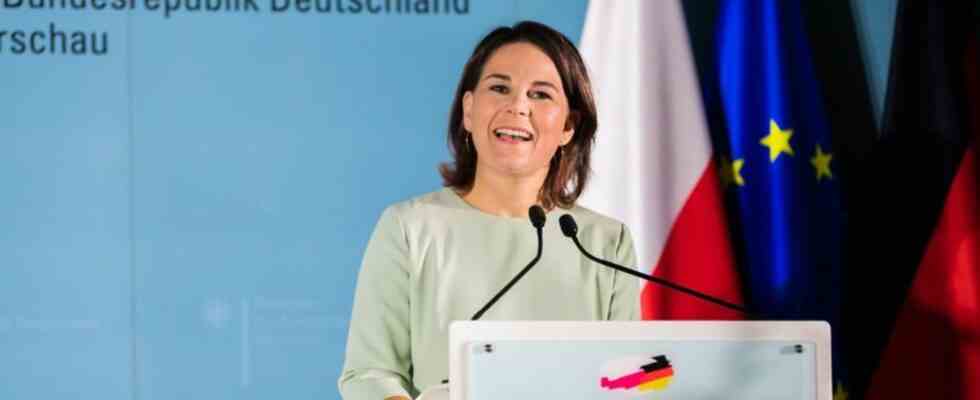diplomacy
Baerbock pledges support to Poland and all of Eastern Europe
Federal Foreign Minister Annalena Baerbock speaks at the celebrations for German Unity Day at the German Embassy in Warsaw. photo
© Christoph Soeder/dpa
A sensitive visit for the Federal Foreign Minister: the meeting with her counterpart Zbigniew Rau is likely to be about Poland’s demands for reparations in addition to aid to Ukraine. Quarrels are inevitable.
Help for Ukraine and dispute over reparation claims in the trillions: At today’s meeting between Foreign Minister Annalena Baerbock and her Polish colleague Zbigniew Rau, controversial issues are on the agenda. The evening before, the Greens politician paid tribute to Poland’s services to German reunification in Warsaw. At the same time, she assured Poland and all of Central and Eastern Europe of their support in view of the Russian war of aggression against Ukraine.
The minister wants to meet her Polish counterpart Zbigniew Rau in the morning. She then plans to take part in the Warsaw Security Forum, in a discussion on the situation in Russia’s war of aggression against Ukraine and its consequences.
Baerbock to Poland: We will be there for you
Baerbock said on Monday evening at a celebration of the German Embassy in the Polish capital on German Unity Day: “We will be there for you, just as you were there for us when we needed you most.” The security of Eastern Europe is Germany’s security. “You can count on that,” she exclaimed.
October 3rd commemorates German reunification in 1990, just under a year after the peaceful revolution in the GDR in autumn 1989. In the 1980s, the Poles overcame the communist regime with protests and thus initiated the turning point in Eastern Europe.
“We will not let up in our support for Ukraine” – together with our partners in the EU and NATO, assured Baerbock. “Because we Germans will never forget that we have our allies and neighbors to thank for our life in freedom, in a reunified country in the heart of Europe.”
Baerbock: Actionable EU common life insurance
For seven months, Europe has been experiencing “a war that is writing a new chapter in our history with a brutal pen,” said Baerbock. The Ukrainians fought not only for the survival of their country, but for a free Europe. “Right now we are experiencing how an effective European Union is not an end in itself, but our common life insurance.”
Germany and Poland are forever connected, said Baerbock. “What we have is a friendship of the heart between millions of people, a friendship and partnership that is stronger than political disagreements.” This friendship has to be worked on again and again, “no matter how challenging it may be at times”.
Appeal to Poland’s PiS government: preserve the partnership
Even before their departure, Baerbock had appealed to Poland after the demands for reparations and sharp tones from the national conservative government to maintain the partnership. “As partners in a common Europe, we have the opportunity to shape our future for the benefit of our children,” she explained. “But we also have a responsibility to maintain the trust that we have built together over the past thirty years.” Coming to terms with and remembering “the immeasurable suffering that Germany brought to the people of Poland” would remain important tasks. “There can’t and won’t be a line here.”
Reparation claims of 1.3 trillion euros
Shortly before Baerbock’s visit, Poland’s PiS government had reiterated its demands for reparations from Germany: Foreign Minister Rau signed a corresponding diplomatic note that is to be handed over to Berlin. PiS boss Jaroslaw Kaczynski also accused the federal government on Sunday of striving for “German supremacy” in the EU
Baerbock did not mention the diplomatic note signed by Rau on the reparations demands on Monday. Rau had stated that the note “expresses the Polish Foreign Minister’s conviction that the parties should take immediate steps towards a permanent, comprehensive and final legal and material settlement of the consequences of German aggression and occupation of 1939-1945”.
On the 83rd anniversary of the start of the Second World War on September 1st, a parliamentary commission in Warsaw presented a report in which the damage caused by the World War in Poland was estimated at more than 1.3 trillion euros.
Rau did not name a specific amount. However, he made it clear that according to Warsaw, a regulation must include “the payment of compensation by Germany for the material and non-material damage that the Polish state suffered as a result of this aggression and occupation”. Victims of the German occupiers and their family members would also have to be compensated. Likewise, a regulation for the looted cultural assets and archives must be found.
The federal government rejects the demand for reparations. In doing so, she refers to the Two Plus Four Agreement of 1990 on the foreign policy consequences of German unity.

